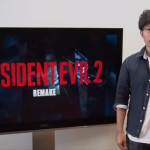Sony launches the WF-1000XM6 in South Africa with upgraded noise cancelling, better call clarity and premium sound. Pricing starts at R7,999.
‘Cradle’ review: odd, bizarre and ultimately wonderful
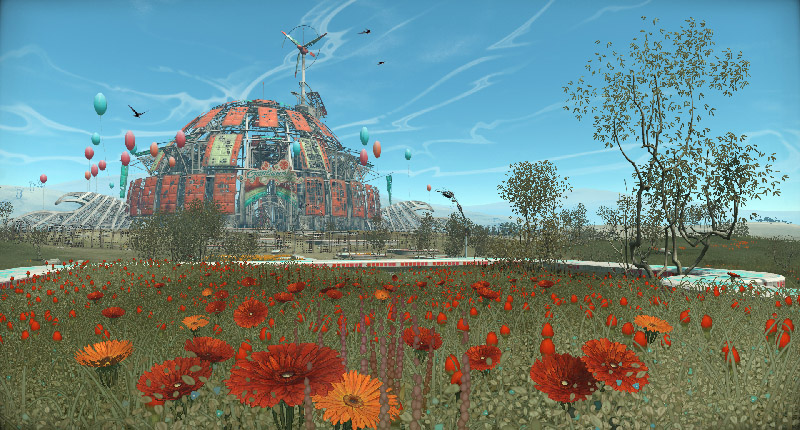
Cradle is a beautifully bizarre experience created by the Ukrainian-based indie game studio Flying Café for Semianimals (its name alone should be an indication of how this strange and creative this game is).
Many of the team members have a strong background in the development of the STALKER franchise and you will clearly see the influences.
Visually, it has the same desaturated look and a world where and the lines between reality and fantasy are masterfully blurred. It also boasts immersive atmospheric scores that sound like they were written by a Space Cowboy.
But most of all, it also has a captivating and challenging narrative that will only leave you begging for more.
Story Time
You are placed inside the shoes of an 18-year-old man. He wakes up in a cluttered Yurt with no recollection of his past or who he is. As he explores its contents, and eventually the world beyond it, he discovers little snippets of information that sheds more light on his life and identity. Your name is Enebish and you are in futuristic Mongolia. But the more answers he gets, the more questions start to arise.
Among the mess in the Yurt, he sees a mechanical but woman-like figure sitting on a table. After getting the mechanical woman online you learn that she is not powered by AI but houses the digitized consciousness of a human. She also has no recollection of her past or identity. Together you both help each other fill in the missing blanks. But it proves to be a much greater and complex ordeal than anticipated and soon you find yourself unravelling a much larger mystery.
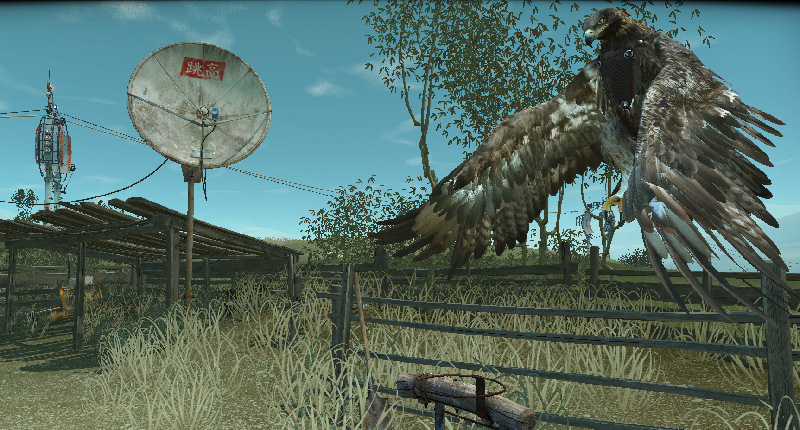
According to Ilya Tolmachev, Creative Director of Flying Café for Semianimals, the game takes much influence from the literary world.
The story in Cradle has combined the mood and ideas from books of several writers: from Albert Camus the story of Cradle received the taste of bitterness and the absurd; Vladimir Sorokin, an eerie feeling of permanent hostility coming out of the reailty; from Andrey Platonow, the feeling of empathy and pity directed towards don’t know who, having no specific addressee; from the Strugatsky brothers, the humanistic confidence in the inevitable triumph of human essence over the animal one.
The story will introduce you to few but highly intriguing personalities. I liked this approach as I formed an intimacy with these characters that not many games explore to this depth. Like Enebish, I also felt like I was remembering why these people were important to me.
Though, as much as I loved the story and its affinity for the unusual, I did feel that by the end it got a bit out of hand. The story did an excellent job of building up to the finale and I found myself racing to reach its conclusion just to be left absolutely dumbstruck.
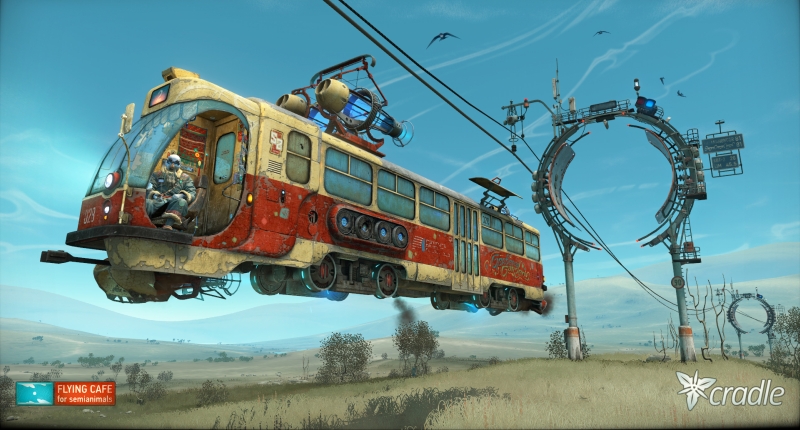
As one YouTube reviewer eloquently put it: “…what the f***? I don’t get it, my friend. I don’t get it”.
For someone who usually quickly grasps the philosophical intent of a narrative, in this case I found myself left in an uneasy confusion. And I didn’t like it.
I eventually realised that by digging around in the world filled in these missing plot holes, if even only slightly. I think at this was the moment that I really fell in love with this game.
It wasn’t holding my hand and guiding my every thought. It left me to do it all on my own and when I finally did see the bigger picture come together it felt all the more satisfying.
Play Time
At first glance Cradle would seem like a very straightforward game. You can pick up objects and move them around, and you are able to have simple interactions with the world around you.
These are ancient game mechanics that have been present in first person games for ages, usually only forming a part of the whole package. But Cradle uses them to such splendid effect that they become ingredients in an exotic potion.
For one example, there is one point in the game where you have to prepare a meal. You light a fire, boil some water in a bowl and throw in some ingredients (an uneventful yet strangely meditative experience). Once the meal is done, you are told to place it outside.
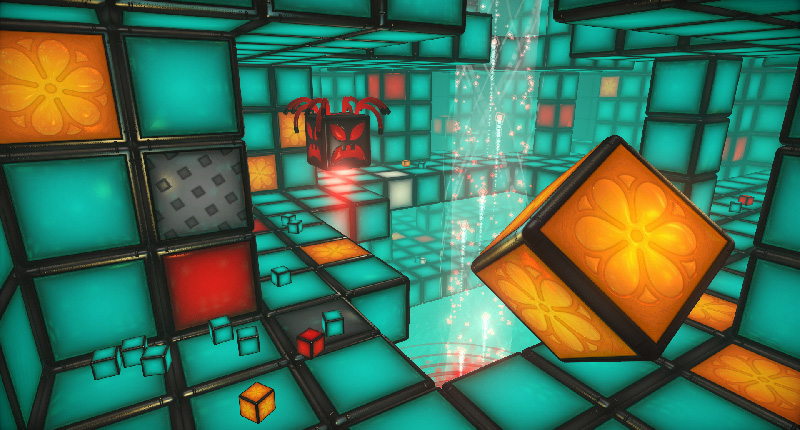
By this time I was wondering what the hell I was busy doing… and then I saw it. As I walked out of my yurt, a strange speck in the sky caught my attention. As it got closer I could make out the shape of large, outstretched wings. As I stood there, bewildered by the moment, a large golden eagle circled around me and then perched itself on a nearby wooden fence waiting for me to provide it with its sustenance.
After going through such a simple, even tedious process I was treated to this amazing spectacle. At this point, I was already so immersed in the game that it felt like I was experiencing it for real. I could walk up to this majestic animal and it simply just waited there for me to put down its meal.
In a way, this is exactly what Cradle is about. It draws you in with everyday menial tasks that slowly but effectively infuses layers of believability within the experience. Then suddenly something fantastic happens and you remember that this is no normal world and you haven’t even started to scratch the surface of its elaborate eccentricity.
One element of Cradle that I did find extremely annoying was the forced mini games. At certain sections of the game you had to take part in a sort of unbeatable (for me at least) array of Minecraft-like puzzles. Although it did form part of the story it felt totally out-of-place in the grand scheme and tone of the story.
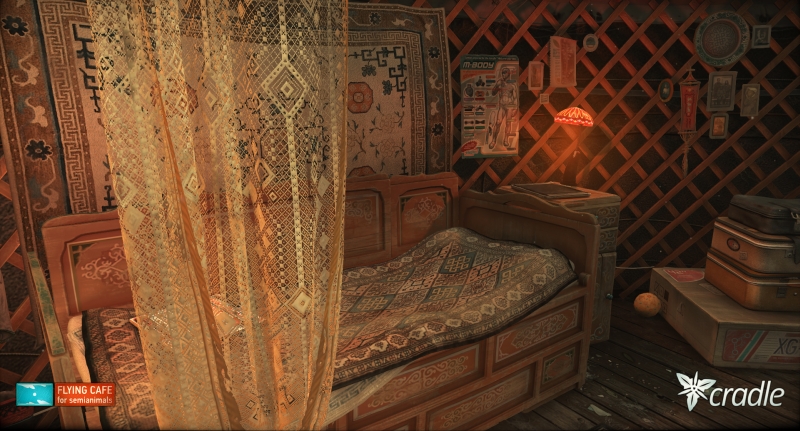
What was even more annoying was that, if you failed, you were presented with the option to skip or replay. So I just wasted ten minutes of my life taking part in something that isn’t even that necessary? But to be honest, it was a minor setback in an otherwise flawless title.
One thing I must admit is that it took me a while to get the hang of this game. At first, I kind of just stumbled around, picked up objects and read the various scattered letters and news clips lying around the yurt.
For a long time I was quite content with this, and I felt that the more I explored and inspected the environment, the greater my sense of the story became. But soon after I quickly started feeling lost and confused.
It was only later that I realised that by pressing TAB you were given hints to what your next move should be, something that wasn’t really clearly expressed in the game. But once I overcame this small obstacle and the narrative started gaining traction I couldn’t get enough of this game.
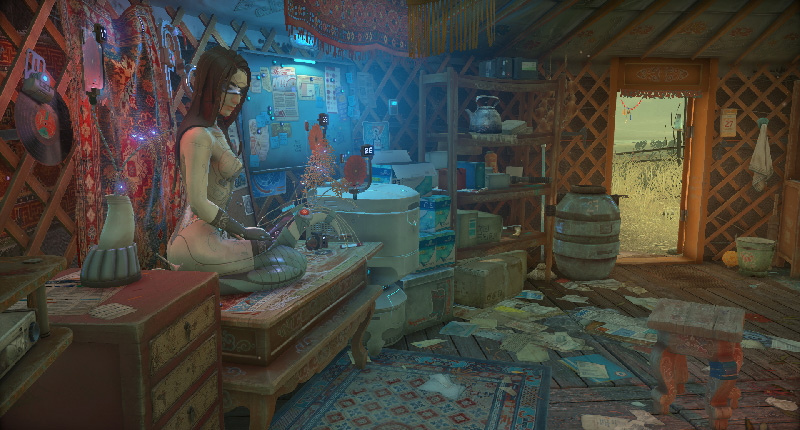
So much so that when a buddy of mine came to visit I started the game from the beginning just to show him how wonderfully weird it is. Usually I would show him a game for a bit and then we would switch over to some 2-player game like FIFA or Mortal Kombat.
But not Cradle. The further we went, the further we wanted to go. It just instilled this insatiable thirst in us that we needed to quench. We spent the remainder of that day exploring its exotic landscape and seeing its story through to the very end.
Afterwards we were left in awe. “What just happened? What that real? What is a dream?” I remember us saying. My only disappointment was (apart from the mini-games and abrupt end) that it had to end.
Game information:
Release Date: 24 July 2015
Developer/Publisher: Flying Café for Semianimals
Engine: UNIGINE Engine
Genre: Adventure
Platform: PC/Steam (review platform)
Verdict: Cradle might not be everyone’s cup of tea, but I will surely recommend you at least give it a chance. Its story is deep, challenging and captivating. Its world is beautifully constructed and boasts a wonderful blend of the foreign and familiar. It’s different from anything I’ve experienced in gaming and I think it’s a title that breathes new life into rather saturated industry.
Score: 8/10
